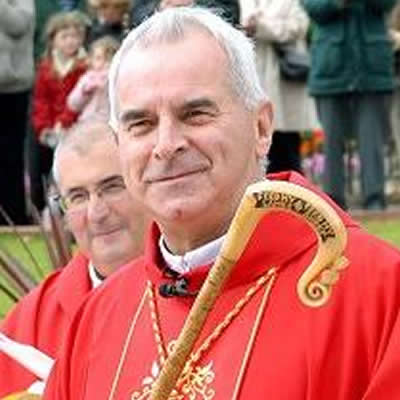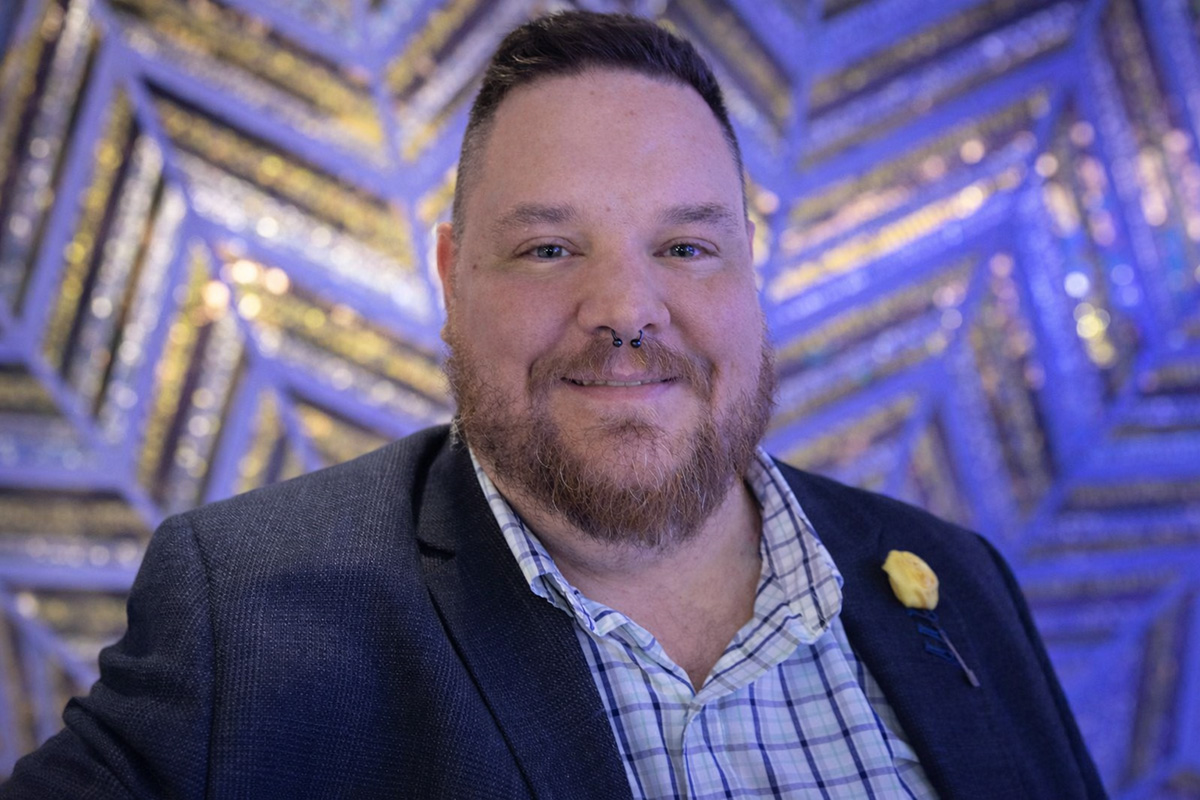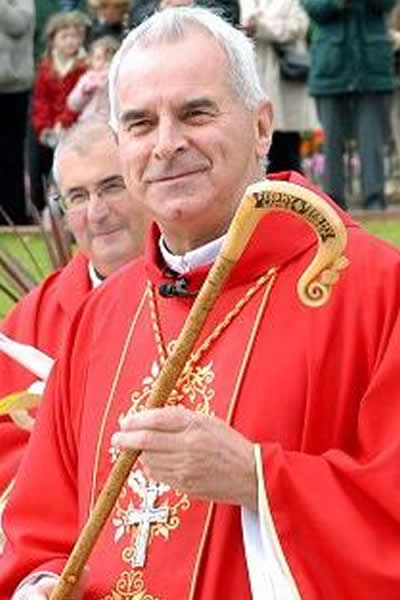News
Cardinal admits sexual misconduct with priests
‘He started fondling my body, kissing me’

In a dramatic development just days before the selection process for a new Pope was to begin at the Vatican, a British Cardinal admitted in a public statement on March 3 that he engaged in sexual misconduct with priests over a period of more than 30 years.
Cardinal Keith O’Brien, 74, the highest-ranking Catholic leader in the United Kingdom and an outspoken opponent of same-sex marriage, issued his statement one week after he abruptly resigned from all of his church duties.
Last week, the Washington Blade reported that the Vatican was downplaying reports of a gay sex scandal after several allegations, including those against O’Brien.
Church insiders believe his resignation was ordered by outgoing Pope Benedict XVI following a report in the British newspaper The Guardian that three priests and a former priest filed formal complaints accusing him of engaging in “intimate” acts with them against their will in the 1980s.
The complaints were filed with the Vatican’s ambassador to the United Kingdom.
“In recent days certain allegations which have been made against me have become public,” O’Brien said in his statement. “Initially, their anonymous and non-specific nature led me to contest them,” he said.
“However, I wish to take this opportunity to admit that there have been times that my sexual conduct has fallen below the standards expected of me as a priest, archbishop and cardinal,” he said. “To those I have offended, I apologize and ask forgiveness.”
He added, “To the Catholic Church and the people of Scotland, I also apologize. I will now spend the rest of my life in retirement. I will play no further part in the public life of the Catholic Church in Scotland.
O’Brien had served as head of the Catholic Church in Scotland, where the three current and one former priest said he made inappropriate advances toward them when three of them were young priests and one of them was a seminarian.
O’Brien’s statement of admission and apology came one day after The Observer published a follow-up story providing specific details of the allegations made by the three priests and former priest.
“He started fondling my body, kissing me and telling me how special I was to him and how much he loved me,” The Observer quoted one of the priests as saying.
The former priest told The Observer he was a seminarian when O’Brien used bedtime prayers as an opportunity to make advances toward him.
“I knew myself to be heterosexual, but I did say to others that I thought it would be easier to get through seminary if you were gay,” The Observer quoted him as saying.
The Observer said it chose to report the additional details with the full consent of the three priests and former priest, whose motives had come under attack by some church defenders because they haven’t publicly disclosed their names.
According to The Observer, the four men disclosed their names in the written complaints they filed with the Vatican ambassador to the U.K., Archbishop Antonio Mennini, in early February.
The Observer reports that the four decided to file their complaint after they discovered for the first time earlier this year that each of them had encountered what they believed to be improper advances from O’Brien years earlier.
The paper said the men chose to contact the media about their complaint when church officials led them to believe that little would be done about their revelations and that O’Brien would be going to Rome to help select a new Pope.
“I’d never wanted to ‘out’ Keith just for being gay,” the former priest, who is now married, told The Guardian. “But this was confirming that his behavior towards me was part of his modus operandi. He has hurt others, probably worse, than he affected me,” The Observer quoted him as saying.
“And that only became clear a few weeks ago,” he told The Observer, in noting his recent discovery of the three others to whom O’Brien made inappropriate advances.
The Observer and other British newspapers have reported that support by church critics for exposing O’Brien’s inappropriate behavior toward priests whose careers and duties were under his control was based also on what they believe to be his blatant hypocrisy.
In recent years, O’Brien spoke out harshly against same-sex marriage and warned the Scottish Parliament that Scotland would suffer dire consequences if it legalized civil marriage for same-sex couples.
He called same-sex marriage a “grotesque subversion of a universally accepted human right. Gay activists in the U.K. said they were especially offended by his description of same-sex relationships as unhealthy and inferior to heterosexual relationships. Among other things, he told the media that legal recognition of same-sex marriage would result in schools being required to teach kids “homosexual fairy stories.”
O’Brien’s statement admitting to sexual misconduct makes him the highest ranking Catholic Church official to make such an admission, according to Vatican observers.
The admission came one week after Vatican officials denounced reports in the Italian press that an underground network of gay priests assigned to the Vatican organized meetings for sex and may have been subjected to blackmail.
Uganda
LGBTQ Ugandans targeted ahead of country’s elections
President Yoweri Museveni won 7th term in disputed Jan. 15 vote

Barely a week after Ugandan President Yoweri Museveni secured a 7th term in an election marred by state violence, intimidation, and allegations of fraud, the country’s queer community spoke about how the election environment impacted it.
The LGBTQ lobby groups who spoke with the Washington Blade noted that, besides government institutions’ failure to create a safe and inclusive environment for civic participation by all Ugandans, authorities weaponized the Anti-Homosexuality Act to silence dissent and discourage queer voter engagement.
The rights groups note that candidates aligned with Museveni’s ruling National Resistance Movement — including Parliament Speaker Anita Among — during the campaigns accused their rivals of “promoting homosexuality” to discredit them while wooing conservative voters.
Queer people and LGBTQ rights organizations as a result were largely excluded from the formal political processes for the election as voters, mobilizers, or civic actors due to fear of exposure, stigma, violence, and legal reprisals.
“This homophobic rhetoric fueled public hostility and emboldened vigilante violence, forcing many queer Ugandans into deeper hiding during the election period,” Uganda Minority Shelters Consortium Coordinator John Grace stated.
Some queer people had expressed an interest in running for local council seats, but none of them formally registered as candidates or campaigned openly because of safety concerns and local electoral bodies’ discriminatory vetting of candidates.
“UMSC documented at least three incidents of election-related violence or intimidation targeting LGBTQ+ individuals and activists,” Grace noted. “These included harassment, arbitrary detentions, extortions by state and non-state actors, digital cat-fishing, and threats of outing.”
Amid such a militarized and repressive election environment, Let’s Walk Uganda Executive Director Edward Mutebi noted queer-led and allied organizations engaged in the election process through restricted informal voter education, community discussions, and documenting human rights violations.
“Fear of backlash limited visibility and direct participation throughout the election cycle,” Mutebi said. “But despite the hostile environment of work, Let’s Walk Uganda was able to organize a successful transgender and gender diverse youth training on electoral security and safety.”
Museveni’s government escalated its repressive actions during the Jan. 15 elections by shutting down the internet and suspending nine civil society organizations, including Chapter Four Uganda and the National Coalition of Human Rights Defenders, for allegedly engaging in activities that are prejudicial to the security and laws of the country.
The suspension of the rights organizations remains in force, an action both Mutebi and Grace condemn. They say it prevents queer Ugandans from accessing urgent services from the affected groups.
“For the LGBTQ community, the impact has been immediate and deeply harmful. Many of the suspended organizations, like Chapter Four Uganda, were critical partners in providing legal representation, emergency response, and documentation of rights violations,” Grace said.
This has compelled UMSC and its other partners to handle increased caseloads with limited resources, while navigating heightened scrutiny and operational risk.
“The suspension has disrupted referral pathways, delayed urgent interventions, and weakened collective advocacy for marginalized groups and minority rights defenders, which calls for urgent international solidarity, flexible funding, and protection mechanisms to safeguard the work of grassroots organizations operating under threat,” Grace stated.
Mutebi warned that such repressive actions are tyrannical and are indicative of shrinking civic space, which undermines democratic accountability as the promotion and protection of human rights is ignored.
With Museveni, 81, extending his tenure at State House from a landslide win of 72 percent, UMSC and LWU consider a bleak future in the protection of rights for queer Ugandans and other minority groups.
“Without significant political and legal shifts, LGBTQ persons will face continued criminalization, reduced civic space, and heightened insecurity, making sustained advocacy and international solidarity more critical than ever,” Mutebi said. “ It is unimaginable how it feels to live in a country with no hope.”
Grace, however, affirmed the resistance by local queer lobby groups will continue through underground networks, regional solidarity, and digital organizing.
The duo noted that a win by Museveni’s main challenger and rapper, Bobi Wine, who only managed 24 percent of the total votes cast, could have enabled the opening up of civil space and human rights protections in Uganda.
Wine, for his part, spoke in favor of the respect for the rule of law and human rights during his campaign.
“While Bobi Wine’s past stance on LGBTQ rights was inconsistent, his recent shift toward more inclusive rhetoric and international engagement suggested a potential opening for dialogue,” Grace said. “A win might have created space for policy reform or at least reduced state-sponsored homophobia, though structural change would still require sustained pressure and coalition-building.”
Mutebi stated that a change in Uganda’s leadership to a youthful leader like Wine could have offered an opening, but not a guarantee for progress on inclusion and human rights. Mutebi added existing institutionalized and societal homophobia remain in place.
Federal Government
Trump-appointed EEOC leadership rescinds LGBTQ worker guidance
The EEOC voted to rescind its 2024 guidance, minimizing formally expanded protections for LGBTQ workers.

The U.S. Equal Employment Opportunity Commission voted 2–1 to repeal its 2024 guidance, rolling back formally expanded protections for LGBTQ workers.
The EEOC, which is composed of five commissioners, is tasked with enforcing federal laws that make workplace discrimination illegal. Since President Donald Trump appointed two Republican commissioners last year — Andrea R. Lucas as chair in January and Brittany Panuccio in October — the commission’s majority has increasingly aligned its work with conservative priorities.
The commission updated its guidance in 2024 under then-President Joe Biden to expand protections to LGBTQ workers, particularly transgender workers — the most significant change to the agency’s harassment guidance in 25 years.
The directive, which spanned nearly 200 pages, outlined how employers may not discriminate against workers based on protected characteristics, including race, sex, religion, age, and disability as defined under federal law.
One issue of particular focus for Republicans was the guidance’s new section on gender identity and sexual orientation. Citing the 2020 U.S. Supreme Court’s Bostock v. Clayton County decision and other cases, the guidance included examples of prohibited conduct, such as the repeated and intentional use of a name or pronoun an individual no longer uses, and the denial of access to bathrooms consistent with a person’s gender identity.
Last year a federal judge in Texas had blocked that portion of the guidance, saying that finding was novel and was beyond the scope of the EEOC’s powers in issuing guidance.
The dissenting vote came from the commission’s sole Democratic member, Commissioner Kalpana Kotagal.
“There’s no reason to rescind the harassment guidance in its entirety,” Kotagal said Thursday. “Instead of adopting a thoughtful and surgical approach to excise the sections the majority disagrees with or suggest an alternative, the commission is throwing out the baby with the bathwater. Worse, it is doing so without public input.”
While this now rescinded EEOC guidance is not legally binding, it is widely considered a blueprint for how the commission will enforce anti-discrimination laws and is often cited by judges deciding novel legal issues.
Multiple members of Congress released a joint statement condemning the agency’s decision to minimize worker protections, including U.S. Reps. Teresa Leger Fernández (D-N.M.), Grace Meng (D-N.Y.), Mark Takano (D-Calif.), Adriano Espaillat (D-N.Y.), and Yvette Clarke (D-N.Y.) The rescission follows the EEOC’s failure to respond to or engage with a November letter from Democratic Caucus leaders urging the agency to retain the guidance and protect women and vulnerable workers.
“The Equal Employment Opportunity Commission is supposed to protect vulnerable workers, including women, people of color, and LGBTQI+ workers, from discrimination on the job. Yet, since the start of her tenure, the EEOC chair has consistently undermined protections for women, people of color, and LGBTQI+ workers. Now, she is taking away guidance intended to protect workers from harassment on the job, including instructions on anti-harassment policies, training, and complaint processes — and doing so outside of the established rule-making process. When workers are sexually harassed, called racist slurs, or discriminated against at work, it harms our workforce and ultimately our economy. Workers can’t afford this — especially at a time of high costs, chaotic tariffs, and economic uncertainty. Women and vulnerable workers deserve so much better.”

The Comings & Goings column is about sharing the professional successes of our community. We want to recognize those landing new jobs, new clients for their business, joining boards of organizations and other achievements. Please share your successes with us at [email protected].
The Comings & Goings column also invites LGBTQ+ college students to share their successes with us. If you have been elected to a student government position, gotten an exciting internship, or are graduating and beginning your career with a great job, let us know so we can share your success.
Congratulations to R. Warren Gill III, M.Div., M.A. on being appointed as the development manager at HIPS. Upon his appointment, Gill said, “For as long as I’ve lived in Washington, D.C., I’ve followed and admired the life-saving work HIPS does in our communities. I’m proud to join the staff and help strengthen the financial support that sustains this work.”
Gill will lead fundraising strategy, donor engagement, and institutional partnerships. HIPS promotes the health, rights, and dignity of individuals and communities impacted by sexual exchange and/or drug use due to choice, coercion, or circumstance. HIPS provides compassionate harm reduction services, advocacy, and community engagement that is respectful, non-judgmental, and affirms and honors individual power and agency.
Gill has built a career at the intersection of progressive politics, advocacy, and nonprofit leadership. Previously he served as director of communications at AIDS United, supporting national efforts to end the HIV epidemic. Prior to that he had roles including; being press secretary for Sen. Bernie Sanders during the 2016 presidential primary, and working with the General Board of Church and Society, the United Methodist Church, the denomination’s social justice and advocacy arm.
Gill earned his bachelor’s degree in philosophy and religious studies, Jewish Studies, Stockton University; his master’s degree in political communication from American University, where his graduate research focused on values-based messaging and cognitive linguistics; and his master of Divinity degree from the Pacific School of Religion.
-

 The White House5 days ago
The White House5 days agoA full year of Trump and LGBTQ rights: all that’s been lost
-

 Health5 days ago
Health5 days agoCVS Health agrees to cover new HIV prevention drug
-

 District of Columbia5 days ago
District of Columbia5 days agoSold-out crowd turns out for 10th annual Caps Pride night
-

 The White House4 days ago
The White House4 days agoTrump-Vance administration ‘has dismantled’ US foreign policy infrastructure

















